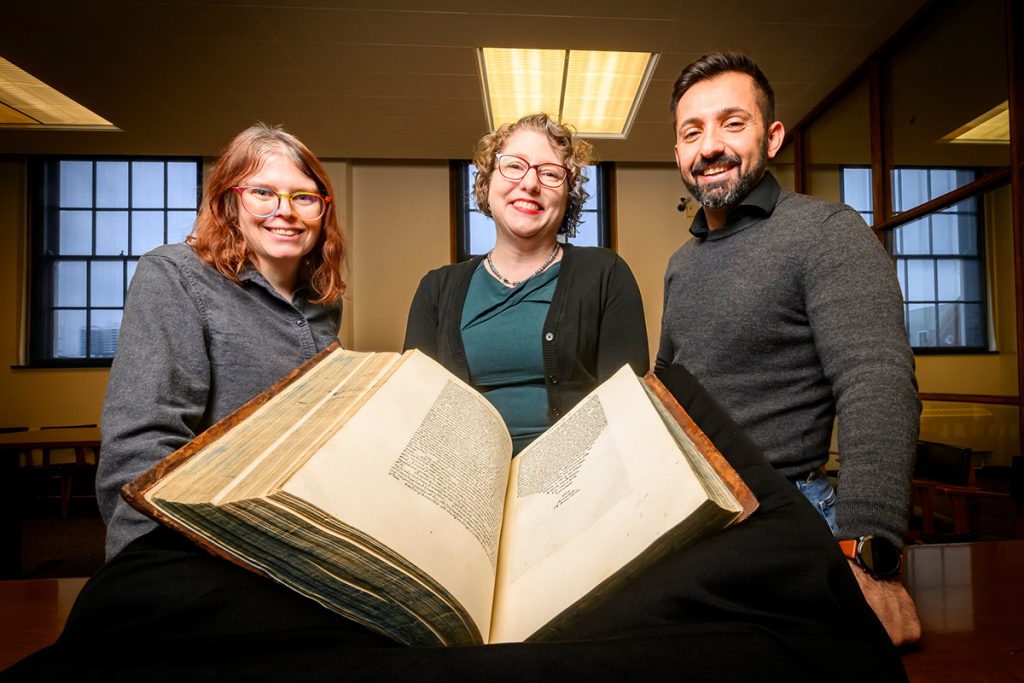
(Photo by Fred Zwicky / University of Illinois Urbana-Champaign)
News release courtesy of the University of Illinois Urbana-Champaign News Bureau:
The Rare Book and Manuscript Library at the University of Illinois Urbana-Champaign has acquired a rare first edition of Plato’s works printed in the Greek language.
The “editio princeps” was printed in Venice in 1513 by Aldus Manutius, the founder of Aldine Press, one of the most successful printing houses of the time.
“It was the beginning of a flourishing of classical studies, and this work contributed to that in great measure. One can’t overestimate the importance of the work in its time and place and what it did for classical scholarship,” said Kirk Sanders, a professor of classics and of philosophy and an expert in ancient philosophy.
The purchase of the book was a joint effort between RBML; the classics library collection, part of the Literatures and Languages Library; and donors George and Jamie Reveliotis of Chicago. George Reveliotis is an Illinois alumnus and a supporter of the classics department.
“We are deeply pleased to add this landmark work of Greek letters to the collections here at Illinois and we’re grateful for the donors that made that possible,” said Lynne M. Thomas, the head of RBML.
It is estimated that around 200 volumes were printed and about 40 are still in existence, Sanders said. “Our classics library is one of the largest and the best libraries for classical studies in North America and in the world. It has an enormous collection. To add something like this in RBML is a wonderful new acquisition,” he said.
The book was part of an attempt in the 16th century to revive classical studies and the study of Greek philosophy.
“This was part of a conscious attempt to make accessible in their original language the entirety of the works of Plato for study. It was incredibly important for reigniting interest in the study of Plato in the West,” Sanders said. “It was dedicated to Pope Leo X in the hope that he would be the savior of classical studies and establish something like a new Platonic Academy.”
RBML has about 30 other titles printed by Aldine Press, including about half of the works that were printed in Greek during Manutius’ lifetime. Aldine Press was “a precursor of what we think of as a university press. It was the first to put together side-by-side translations and works for scholarly study,” Thomas said.
Printing the volume of Plato’s works in Greek was a massive undertaking, said RBML curator Cait Coker.
“One of the things that is extraordinary about it is that the Greek typography is really challenging because of all the accents. The letter ‘a’ has 46 different versions,” Coker said. “Despite the difficulties of developing Greek typography, Greek literature was very important, and its classical texts were standard bodies of work read by scholarly people.”
Manutius created new set of Greek typographical characters based on handwriting and made specifically for printing this work, said Elias Petrou, the librarian for classical studies, medieval studies and modern Greek studies in the Literatures and Languages Library. The process of creating the typeset itself may have taken up to a decade, he said.
Manutius implemented several technological advances in printing the Plato volume, Petrou said. Manutius created smaller, portable books that could be carried around, in contrast to the massive books that had to be used in the place where they were kept. While the Plato volume is quite large by today’s standards, it was small for its time, he said.
Manutius used compressed paper and italics to save space, and he introduced the use of punctuation such as the comma and semicolon to help readers better understand what they were reading, Petrou said. The text of the Plato book is in the middle of the pages, with wide empty margins for users to make notes. The book purchased by RBML has very few notes and is in its original condition other than being rebound in the 17th or 18th century, he said.
“This is in mint condition. It looks like almost no one touched it,” Petrou said.
Sanders said he is looking forward to taking students to see the volume.
“It’s amazingly beautiful. It’s the sort of thing to get students excited about the history of scholarship and ancient philosophy,” he said.
The book will travel to a Feb. 10 event at Chicago’s National Hellenic Museum to celebrate its acquisition with the Reveliotis family, other members of Chicago’s Greek community, the consul general of Greece in Chicago, Greek dignitaries and classics scholars. The event coincides with celebrations for the International Day of the Greek Language on Feb. 9. The volume will be packaged in a padded travel case, and RBML commissioned a new traveling exhibit case, which is being made by the university’s mill shop, Thomas said.
A similar event to showcase the new volume will take place on campus in May.